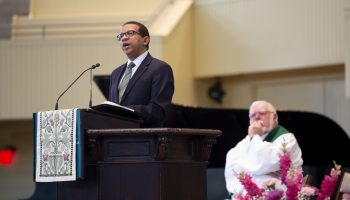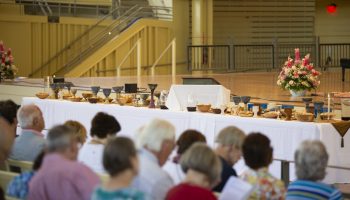“Personally, I have never seen a person lying in a ditch, but a ditch is no place for a person to be,” said the Rev. David E. Goatley at the 10:45 a.m. Sunday morning worship on July 9 with communion in the Amphitheater. “Sometimes people find themselves lying in a ditch, but they did not try to get there.”
Goatley’s sermon title was “Aiming for the Ditch,” and the Scripture text was the Gospel of Luke 10:25-37, the story of the Good Samaritan.
A ditch, Goatley said, is a narrow trench that runs alongside a road or field. It is necessary to drain water and to prevent erosion. Sometimes, the ditch is used for purposes that it was not designed for, as a receptacle for things thrown away.
“I have seen water in ditches, some of it clean, but mostly dirty,” he said. “It is not fit for consumption, but people gather it for bathing, cooking and drinking.”
Goatley said he has seen plastic bottles, cans, rusted metal, and dead animals in ditches; however, he had never seen a person in need.
The traveler in Jesus’ parable was put in the ditch, Goatley said.
“Someone attacked him and left him for dead, treated him as an object, like trash,” he said.
Some people walked by at a safe distance; they did not want to risk being near the debris.
“Perhaps they were dressed for a special occasion,” Goatley said. “Getting near the ditch would divert them from their intended accomplishments.”
The priest and the Levite avoided the traveler. Goatley said they “intentionally pass by on the other side. What was going on inside them to allow them to walk by?”
Before getting too judgemental, he told the congregation, think about all the emotionally and physically beaten up people we walk by.
“Think of the leaders who see those who have been intentionally discarded and intentionally walk by,” Goatley said. “They have learned to avoid the ditch.”
In order to inherit eternal life, “you can’t avoid the ditch, you have to aim for the ditch,” he said. The Good Samaritan was a victim of discrimination himself, but when he saw the traveler, he aimed for the ditch.
The Samaritan went to help the man in trouble. He did not just stumble off the road, “he stepped in the waste, he got wet, but he aimed for the ditch,” Goatley said.
Jesus, in the story in Luke, is asked by a lawyer what he has to do to inherit eternal life. Jesus asked him what he had been taught, and the lawyer answered to love God with all his heart and soul and his neighbor as himself. Jesus told him that was correct.
But the lawyer went further and asked, “Who is my neighbor?” Goatley suggested that many theological interpreters say that “we must be neighborly to those who have needs.”
“That is too thin for me,” Goatley said. “It makes me uncomfortable.”
His discomfort is that this thinking “allows us to be on the road and see from a distance. It is us who should help them.” This thinking keeps divisions alive, “this or that, sacred or secular, rich or poor, black or white, male or female.”
Bishop Desmond Tutu, in his sermon, “Agents of Transfiguration,” at his elevation to archbishop, used the word “ubuntu,” a Khosa word that has no direct translation.
“You know when it is present,” Goatley said, “and you miss it when it is absent. It means to be ‘bound together in the bundle of life.’ ”
That means, he said, that your joys are my joys, your pain is my pain, your success is my success, your victory is my victory, your struggle is my struggle.
“When you are bound up in the bundle of life, you don’t have the luxury of complaining about ‘them’ because we are all bound together,” Goatley said.
He told the congregation that we cannot say, “But for the grace of God, there go I.” We must say, “Because of God’s grace, I will meet you there.” We cannot separate ourselves from the catastrophes around us.
“People who know they are bound up together in the bundle of life aim for the ditch because in the ditch are the people left for dead,” he said.
They think, “Because you are in the ditch, I am in the ditch.”
Goatley gave a paraphrase of Matthew 25: “For I was hungry in the ditch, and you gave me food. I was thirsty in the ditch, and you gave me something to drink. I was sick in the ditch, and you took care of me. I was in prison in the ditch, and you visited me.”
The people asked, “When did we see you in the ditch?” and Jesus told them, “When you did this for the least of these who were in the ditch.”
“We are called to aim for the ditch,” Goatley said. “Jesus in the manger aimed for the ditch. Jesus in welcoming the tax collector aimed for the ditch. Jesus, when he broke the rules and talked to the Samaritan woman, aimed for the ditch. When Jesus was tried, beaten, mocked and crucified, he aimed for the ditch.”
But the ditch is not Jesus’ dwelling place. He rescued those who had been robbed, beaten and left for dead to eternal life, said Goatley.
“When he rose from the ditch, he took with him all who needed safety and life,” he said. “Someone has been robbed, beaten and left for dead. Someone needs you to aim for the ditch.”
The Right Rev. V. Gene Robinson, vice president of religion, presided at the service. The Rev. Carmen Perry, pastor of the Hurlbut Memorial Community United Methodist Church, and Deacon Ray Defendorf, a permanent deacon in the Roman Catholic Church serving in Cornell, New York, read the Scripture. Jared Jacobsen, organist and coordinator of worship and sacred music, directed the Chautauqua Choir. The first anthem was “Heaven Hill” written by Marjorie Thomas, a longtime member of the Chautauqua Choir. The second anthem was “Psalm 23: The Lord Is My Shepherd” by John Rutter. Barbara Kemper Hois, flute, and Rebecca Kemper Scarnati, oboe, provided additional accompaniment. The offertory anthem was “As a Chalice Cast of Gold” by Thomas H. Troeger, commissioned by the Chau- tauqua Choir in honor of Jacobsen on his appointment as its director in 2003. The music during communion was “O Sacrum Convivium!” by Olivier Messiaen. The communion anthem was “Break Thou the Bread of Life,” originally titled “A Study Song for Chautauqua,” written in 1877 by Mary Artemisia Lathbury, choral setting by David E. Kellermeyer. The organ postlude was “‘Trinity,’ Fugue in E- at, S.552,’
by Johann Sebastian Bach. The Lois Raynow Department of Religion Fund and the Harold F. Reed Sr. Chaplaincy provide support for this week’s services.
Robinson served as celebrant during the Ecumenical Communion Service. He was joined at the table by Perry, Goatley and the chaplains for the week from Chautauqua’s denominational houses. The coordinators for communion were Ruth Becker, logistics, and Alma Gast Buco, clergy and assistants. The communion bread was baked by members of the Chautauqua community, including Jean Badger, Gena Bedrosian, Jean Finnerty, Doreen Gould, Barbara Halpern, Mary Ellen Kimble, Nancy Nelson, Anne Palomaki, Suzanne Shull, Linda Stutz, Renee Tomlinson and Linda Wieland.
The communion grape juice was donated by the Growers Cooperative Grape Juice Company. It was made from local grapes, pressed and bottled at its processing plant in Westfield in buildings which originally housed the Welch’s Grape Juice Company. The matched chalices were created in 2005 by the ceramics studio of the Chautauqua School of Art under the direction of Jeff Greenham.
The United Methodist House provided Bishop John Heyl Vincent’s own chalice, a cup made in Erie, Pennsylvania, that predates the Institution. Other denominational houses that provided chalices included the Baptist, Chautauqua Catholic Community, Disciples of Christ, Evangelical Lutheran Church in America, Presbyterian Church (U.S.A.), United Church of Christ and Unitarian Universalist.
The processional banners were provided by the following religious groups and denominational houses: Baptist, Chautauqua Catholic Community, Disciples of Christ, Episcopal, Ecumenical Community of Chautauqua, International Order of King’s Daughters and Sons, Evangelical Lutheran Church in America, Presbyterian Church (U.S.A.) and United Church of Christ.
At least 25 clergy and 25 assistants served communion at stations all around the Amphitheater. The gold silk stoles and matching paraments were from Jared Jacobsen’s collection for the First Lutheran Church, San Diego, California.





